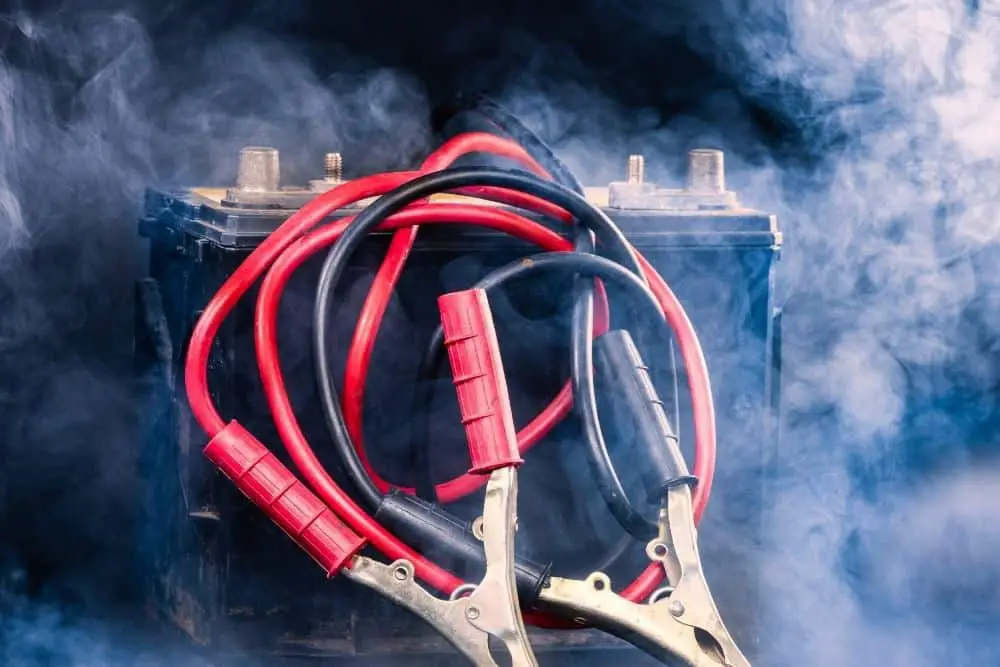So, let’s figure out how to retain our calm when dealing with overheated RV batteries. The majority of RVers, whether they are traveling full-time, part-time, or both, have had to fix something at some point. Before you call an RV mechanic, try troubleshooting the issue on your own if it’s an easy fix that you can do yourself.
Bad batteries or connections can cause RV batteries to overheat. Make sure your battery has the correct amount of distilled water and that all connections are clean and tight before you start working on it further. Perform a voltage check to discover if the battery needs to be replaced. If so, replace it.
Working with batteries, wiring, and electricity might be scary if you aren’t an expert. Learn everything you need to know about being safe while using equipment in this post.
How Do You Know If You Have an Overheating Battery on Your hands?
This is what to look for if you think your battery is getting too hot. Activate all of your senses and prepare for the experience:
- Have you smelled a strong sulfur-like odor coming from them? If your RV has an odor of rotting eggs, it’s likely due to overheated batteries. Battery degradation can cause acid to evaporate and give off a foul odor.
- Heard a boiling sound? Boiled batteries are obviously a bad sign. Overheating or even boiling could occur if the acid in your battery evaporates.
- See them swelling? Swelling can occur if your battery is damaged. If you overcharge a battery, the process inside the battery will be accelerated, releasing heat and gasses, which will cause the battery to expand.
- Notice steam coming out? Steam or smoke coming from your battery might also be an indication of an overheated battery. Batteries that have been overcharged might develop dead cells and leak gas. When working with steam or smoke of any kind, exercise extra caution because it is potentially harmful and flammable.
*When performing battery maintenance, always wear gloves and goggles to protect your hands and eyes. Face masks should also be used if your battery is releasing toxic fumes. Also, absolutely no smoking or using anything with an open flame.
Why is My RV Battery Overheating?
Now that we’ve established that our battery is becoming too hot, let’s move on. But what we don’t know is why. Batteries can overheat for a variety of reasons. I believe we can identify the problem if we do a diagnostic check step by step.
- The very first step in this process should be done monthly as routine maintenance. Verifying that your batteries have the proper electrolyte and water balance to avoid having to add distilled water. Tap water can lead to calcium sulfation, therefore avoid using it. Charging with the vents closed reduces water loss and boiling.
- Then it’s time to check connections. As you check each battery-connected cable and device, keep an eye out for frayed or frayed wires that could cause problems. Wires that are frayed or connections that are loose can lead to serious issues, both now and in the future. Proper maintenance of these is strongly suggested.
- Check your charge controllers. A display panel with temperature readings and adjustment choices is common on charge controllers. Even if you have an aftermarket control unit, you should be able to obtain some useful information from the factory-installed unit.
- Check your user’s guide for instruction. It’s important to double-check that your battery is set to the correct temperature and to check for a temperature readout if possible.
Are You Charging Too Much or Too Little?
It’s not a good idea to keep charging an already-charged battery. You are in control; make good use of it! It’s possible that your charge controller is malfunctioning if you’re using it and still reading a full charge.
Undercharging of RV batteries is also a typical issue that we deal with. Do you keep an eye on the charge levels of your devices? If you don’t let your battery recharge in between cycles, you run the risk of depleting it. Consequently, the battery’s life may be drastically shortened.
Getting the most out of your purchase requires striking a healthy balance. It’s safer to use a battery every day at 50% than to let it go to 25% and risk shortening its life.
A Road Trip to the Mechanic
If, after following the above methods, you are still unable to identify the root cause of your battery’s overheating, it’s time to entrust the job to the experts.
There’s no need to feel guilty about what’s happened; you’ve done everything you could. You’ll have peace of mind knowing your problem is being properly addressed and solved if you take it to a reputable RV dealership or technician.
Make sure you ask them about what they found and how to avoid it happening again when you are there. When something goes wrong, the mechanic is usually more than ready to explain why. Make a note of it in your logbook and keep it handy for future use.
Proper ventilation
Your RV batteries’ life and performance might be impacted by the outdoor temperature. However, the additional heat generated in a small enclosed space can cause the temperature within the battery compartment to rocket even higher. By enabling them to breathe, you can extend their useful life by giving them adequate ventilation.
Place the batteries in an area with built-in vents or enough room around them for air to circulate. It never hurts to add more vents when you can, but it provides you peace of mind knowing that your batteries are properly ventilated.
Draining the Life Out of Your Battery
RV owners are familiar with battery depletion known as “parasitic” or “phantom.” Like a parasite, it slowly depletes the battery’s energy. Electric-powered gadgets like your refrigerator, radio, clock, and other timepieces cause this.
A persistent strain on your battery, along with these parasitic drains, can cause the cells to degrade and create overheating, both of which can be detrimental.
Safe Storage
Consider putting your RV in a storage facility. Prepare your equipment for storage ahead of time to avoid troubles in the future. While you’re cleaning out your refrigerator and cabinets and shutting all the windows, consider these battery care tips.
- Keep batteries charged. When batteries are stored for an extended period of time, the power might be lost and the cells damaged. Making them unusable the next time you take the gear out. Maintaining the health of your battery is easy with a battery maintainer.
- Fill ‘er up! Make sure the water level is correct before putting it away. Even though you’ve been doing it on a regular basis all season, it’s just as crucial to remember to do it once and again.
- Lube. Corrosion can be avoided by keeping your battery terminals properly lubricated at all times. Battery lube isn’t in your possession? Another option is to use a spoonful of petroleum jelly on each post.
- Stop the freeze! If you’re putting your RV away for the winter in a chilly region, you might want to think about transferring your batteries somewhere warmer. If temperatures fall below a certain level, the water inside the battery may freeze. If you do decide to move it, avoid storing it on a cement floor if possible. Our post on How to store an RV battery for the winter has more information.
- Keep the heat out! Is your RV going to be stored during the hottest months? Even when your batteries aren’t in use, the heat can be brutal on them. Before putting them away, make sure the water level isn’t too low and that there’s enough room around them for them to breathe.
A brief walk-through of your rig, while it’s in storage, won’t harm you if you happen to be passing through. It’s better to be on the safe side than to be sorry. Instead of waiting until next season when the problem may be worse and significantly more expensive if you detect any concerns, you can stop and prevent any additional harm!


